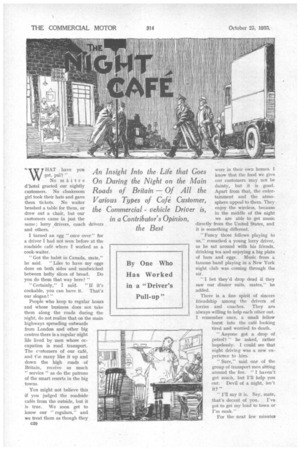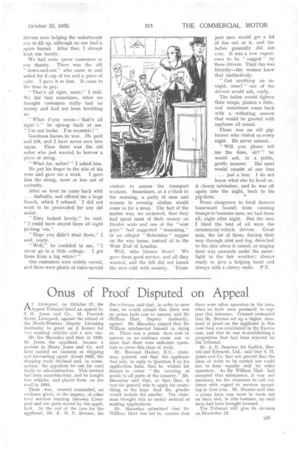" w u HAT have yo got, pal? "
Page 62

Page 63

If you've noticed an error in this article please click here to report it so we can fix it.
No maitre d'hotel greeted our nightly customers. No cloakroom girl took their hats and gave them tickets. No waiter brushed a table for them, or drew out a chair, but our customers came in just the same ; lorry drivers, coach drivers and others.
I turned an egg " once over" for a driver I had not seen before at the roadside café where I worked as a cook-waiter.
" Got the habit in Canada, mate," he said. " Like to have my eggs done on both sides and sandwiched between hefty slices of bread. Do you do them that way here? "
"Certainly," I said. " If it's cookable, you can have it. That's our slogan!"
People who keep to regular hours and whose business does not take them along the roads during the night, do not realize that on the main highways spreading outwards from London and other big centres there is a regular night life lived by men whose occupation is road transport. The cestomers of our cafe, and Vie many like it up and down the high roads of Britain, receive as much "service " as do the patrons of the smart resorts in the big owns.
You might not believe this if you judged the roadside cafes from the outside, but it is true. We soon get to know our "regulars," and we treat them as though they c29 were in their own homes. I know that the food we give our customers may not be dainty, but it is good. Apart from that, the entertainment and the atmosphere appeal to them. They enjoy the wireless, because in the middle of the night we are able to get music directly from the United States, and it is something different.
"Fancy those fellows playing to us," remarked a young lorry driver, as he sat around with his friends, drinking tea and enjoying a big plate of ham and eggs. Music from a famous band playing in a New York night club was coming through the air.
'I bet they'd drop dead if they saw our dinner suits, mates," he added.
There is a fine spirit of sincere friendship among the drivers of lorries and coaches. They are always willing to help each other out. I remember once, a small fellow burst into the café looking tired and worried to death.
" Anyone got a drop of petrol? " he asked, rather hopelessly. I could see that night driving was a new experience to him-.
"Sure," said one of the group of transport men sitting around the fire. " I haven't got much, but I'll help you out. Devil of a night, isn't it? "
" I'll say it is. Say, mate, that's decent of you. I've got to get my load to town or I'm sunk."
For the next few minutes drivers were helping the unfortunate one to fill up, although no one had a spare funnel. After that, I always kept one handy.
We had some queer customers in our shanty. There was the old " down-and-out" who came in and asked for it cup of tea and a piece of cake. I gave it to him. It came to the time to pay.
" That's all right, mate," I said. We did that sometimes, when we thought customers really had no money and had not been troubling us.
" What d'you mean—' that's all right ? " he sprang back at me. "I'm not broke. I'm eccentric " Goodness knows he was. He paid and left, and I have never seen him again. Then there was the old sailor who just wanted to borrow a piece of string.
"What for, sailor? " I asked him.
He put his finger to the side of his nose and gave me a wink. I gave him the string, more or less out of curiosity.
After an hour he came back with . . daffodils, and offered me a large bunch, which I refused. I did not want to be prosecuted for any old sailor,
"They looked lovely," he said. "I could have stayed there all night picking 'em."
"Hope you didn't steal them," I said, coyly.
"Well," he confided in me, " I never go to a little cottage. I got these from a big estate! "
Our customers were widely varied, and there were plenty of extra-special visitors to amuse ' .the transport workers. Sometimes, at 4 o'clock in the morning, a party of men and women in evening clothes would come in for a meal. The fact of the matter was, we reckoned, that they had spent most of their money on theatre seats and one of the "wise guys" had suggested "slumming," or an alleged " Bohemian " supper on the way home, instead of in the West End of London.
Well, who blames them? We gave them good service, and all they wanted, and the bill did not knock the men cold with anxiety. Trans
port men would get a lot of fun out of it, and the ladies generally did not care. It was a new experience to be " ragged " by these drivers. Their fun was friendly—the women knew that instinctively.
"Got anything on tonight, miss?" one of the drivers would ask, coyly.
The ladies would tighten their wraps, pinken a little, and sometimes come back with a withering answer that would be greeted with applause all round.
There was an old pigfarmer who visited us every night. He never missed.
" Will you please tell me the time, sir'? " he would ask, in a polite, gentle manner. His meal would consist of ,one bun . . . just a bun. I do not know what else he lived on. A cheery salutation, and he was off again into the night, back to his pig-farm.
From clergymen to tired dancers homeward bound; from cunning tramps to business men; we had them all, night after night. But the men I liked the best of all were the commercial-vehicle drivers. Great men, the lot of them; forcing their way through mist and fog, drenched to the skin when it rained, or singing their way onwards under the moonlight in the fair weather ; always ready to give a helping hand and always with a cheery smile. P.F.
















































































































































